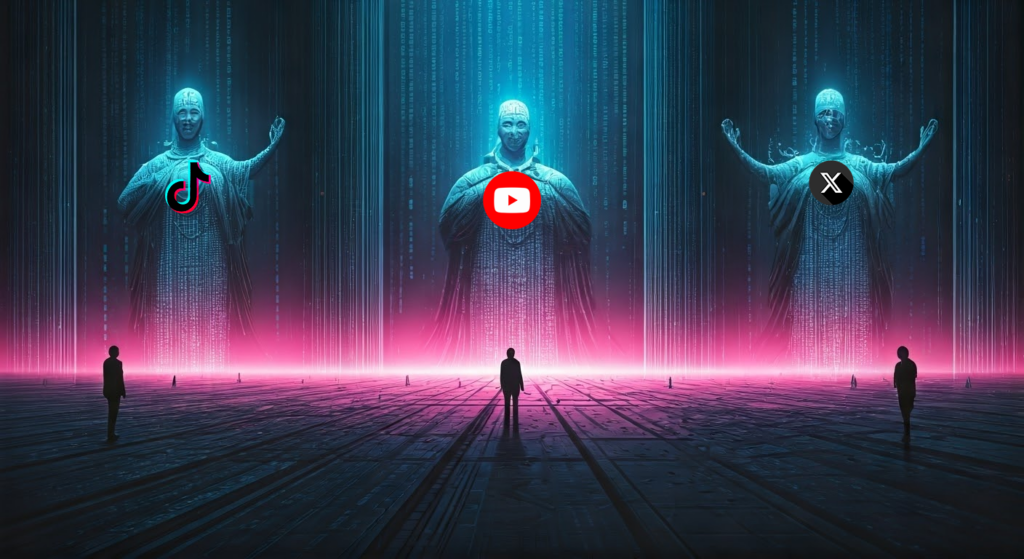The Algorithm gods: How TikTok, YouTube & AI Decide What You Worship

In the Beginning, There Was the Feed…
There was a time when what you loved—music, fashion, movies, even your beliefs—was shaped by gatekeepers. Record labels, TV stations, magazine editors, cultural critics. They told you who to watch, what to listen to, and what trends mattered. But that era is over.
Today, the algorithm is the gatekeeper, the high priest, the unseen god pulling the strings of global culture. It knows what you like before you do. It serves you content you never asked for but suddenly can’t stop consuming. And in doing so, it creates entire fandoms out of thin air—turning random people into icons, making or breaking careers, and shifting billions of dollars in attention and influence with a single tweak to its mysterious code.
If fandom is the new religion, then TikTok, YouTube, and AI-powered platforms are the algorithm gods—dictating what gets worshipped and what gets ignored.
The Algorithm as the Ultimate Tastemaker
Consider this: before TikTok, no one cared about sea shanties. Then, in early 2021, a Scottish postman named Nathan Evans posted himself singing a 19th-century whaling song, “The Wellerman.” The video exploded. Within weeks, a forgotten folk tradition was resurrected, leading to remixes with major DJs, chart-topping hits, and even a Saturday Night Live skit.
This wasn’t organic. It was algorithmic intervention.
TikTok’s algorithm had decided—through a complex mix of engagement signals, behavioral predictions, and pattern recognition—that sea shanties were the next viral moment. Millions of users were suddenly exposed to the trend, whether they sought it out or not.
The same mechanism turned K-pop’s BTS into a global force, fueled the rise of Afrobeats worldwide, and made AI-generated influencers like Lil Miquela as relevant as human celebrities.
Platforms like TikTok and YouTube don’t just reflect culture—they manufacture it.
From Celebrities to AI Idols
Historically, fame was earned through talent, connections, or sheer luck. Today, it’s an algorithmic formula.
Take Milla Sofia, a Finnish model with thousands of Instagram followers. She posts beachside photos, outfit inspiration, and travel shots. Everything seems normal—until you realize she doesn’t exist. Milla is an AI-generated influencer. She doesn’t age, doesn’t get canceled, and doesn’t demand a paycheck.
And yet, the algorithm ranks her higher than many real influencers.
TikTok, Instagram, and YouTube have learned that AI-generated influencers get higher engagement, lower controversy, and better ad revenue. As a result, algorithms push their content to wider audiences, subtly training us to accept—and even prefer—fictional idols over human ones.
In a world where algorithms optimize for efficiency and engagement,the future of fame might not even require real people.
The Power to Shape Reality
In 2023, Spotify CEO Daniel Ek admitted that two-thirds of all streamed music had zero human listeners. Instead, the streams were coming from AI bots, playlist farming, and algorithmic manipulations.
Translation? What you think is popular might actually be an illusion.
Record labels now hire algorithm hackers to game the system, ensuring that their artists land on trending playlists. Influencers use engagement pods and bot farms to trick TikTok’s AI into thinking they’re the next big thing. Even book publishing has seen an influx of AI-generated novels flooding Amazon’s bestseller lists.
This isn’t about merit or talent anymore. The algorithm gods decide who gets to be famous—and sometimes, the humans have no say in it.
Algorithm Worship: How Your Tastes Are Not Your Own
Ever wonder why you suddenly start seeing the same product everywhere? From TikTok trends to Instagram ads, platforms are designed to push what they want you to love—and it works.
A 2024 study by the University of Amsterdam found that 92% of Gen Z consumers discover new music, fashion, and brands through algorithmic feeds rather than personal recommendations. More importantly, 78% said they trust these feeds more than human suggestions.
Your playlists, your fashion choices, even your political views—they aren’t entirely yours. They’re the sum of what an algorithm has calculated you should believe.
In a world where AI dictates what rises and falls in culture, the real question is: Are we worshipping the algorithm, or is the algorithm worshipping us?
Who really has the power?